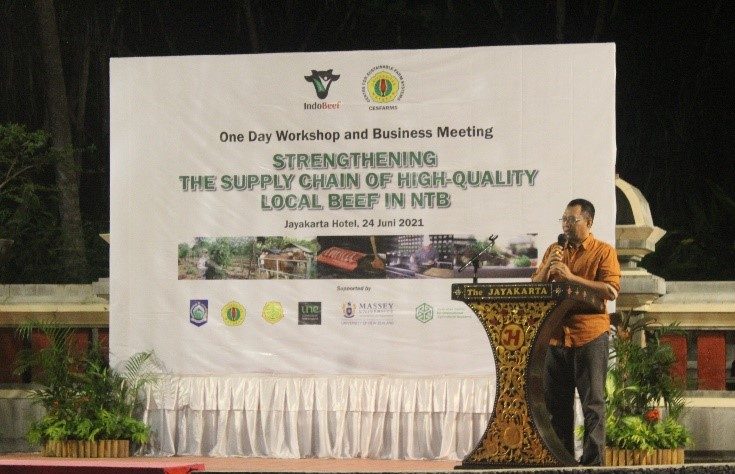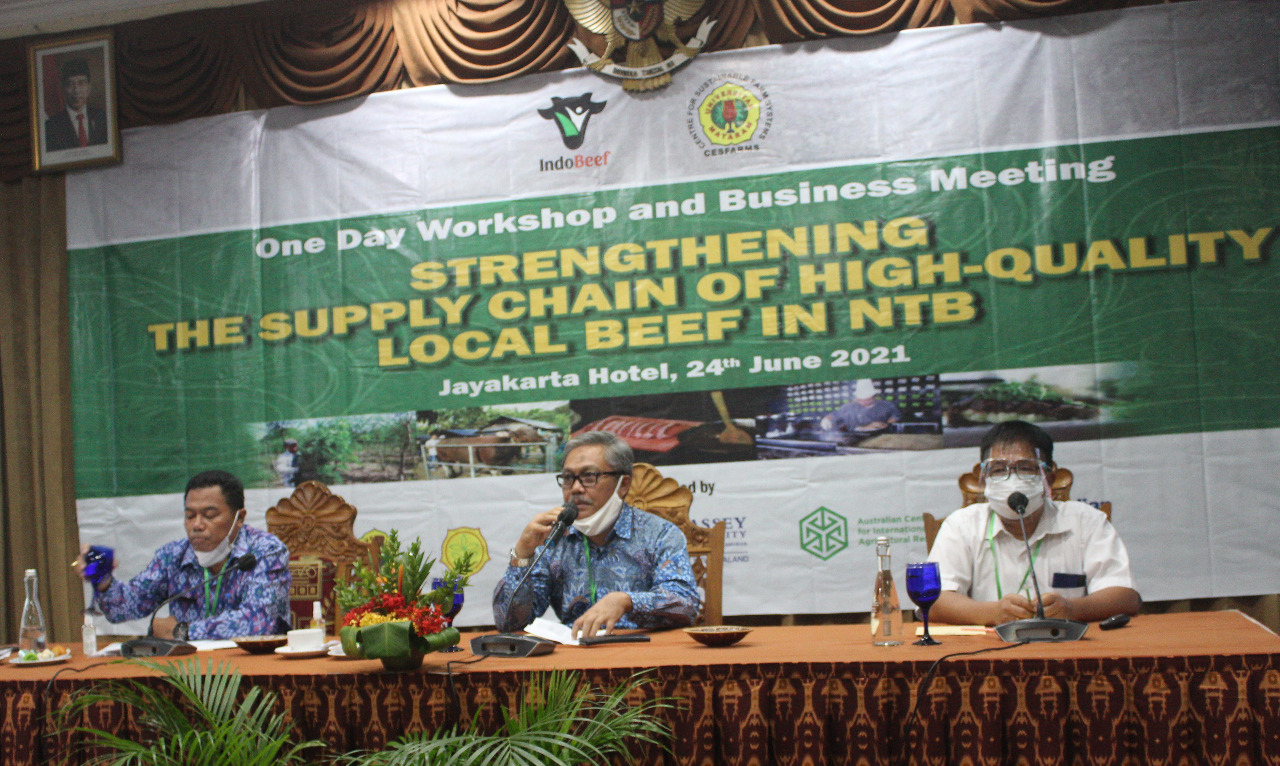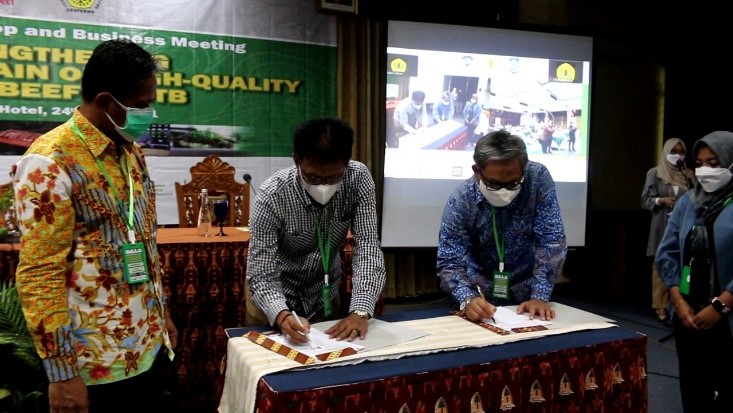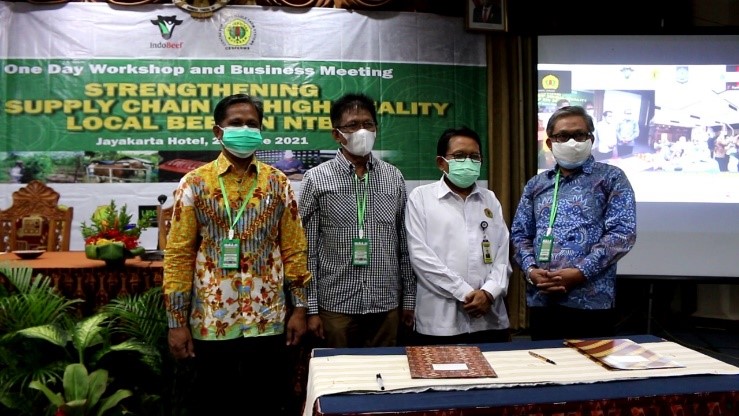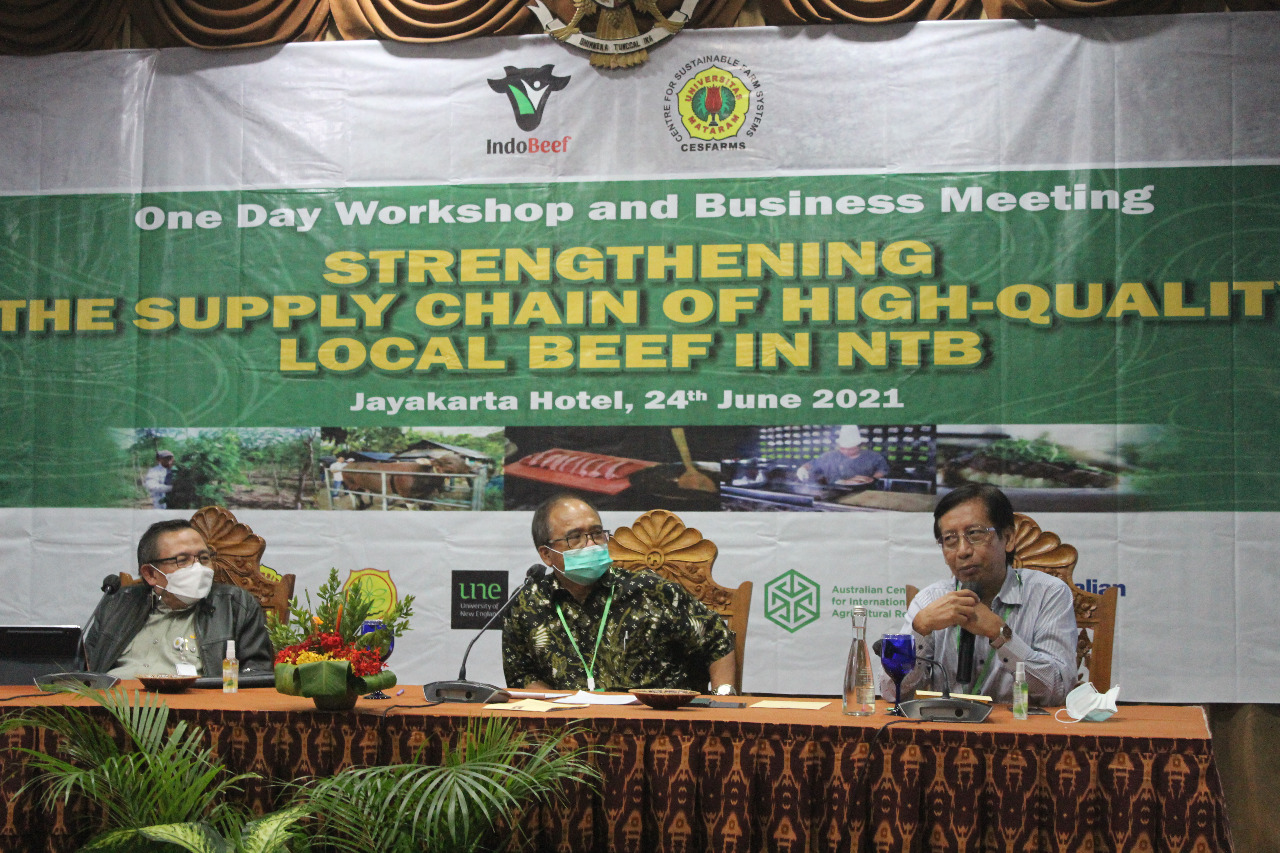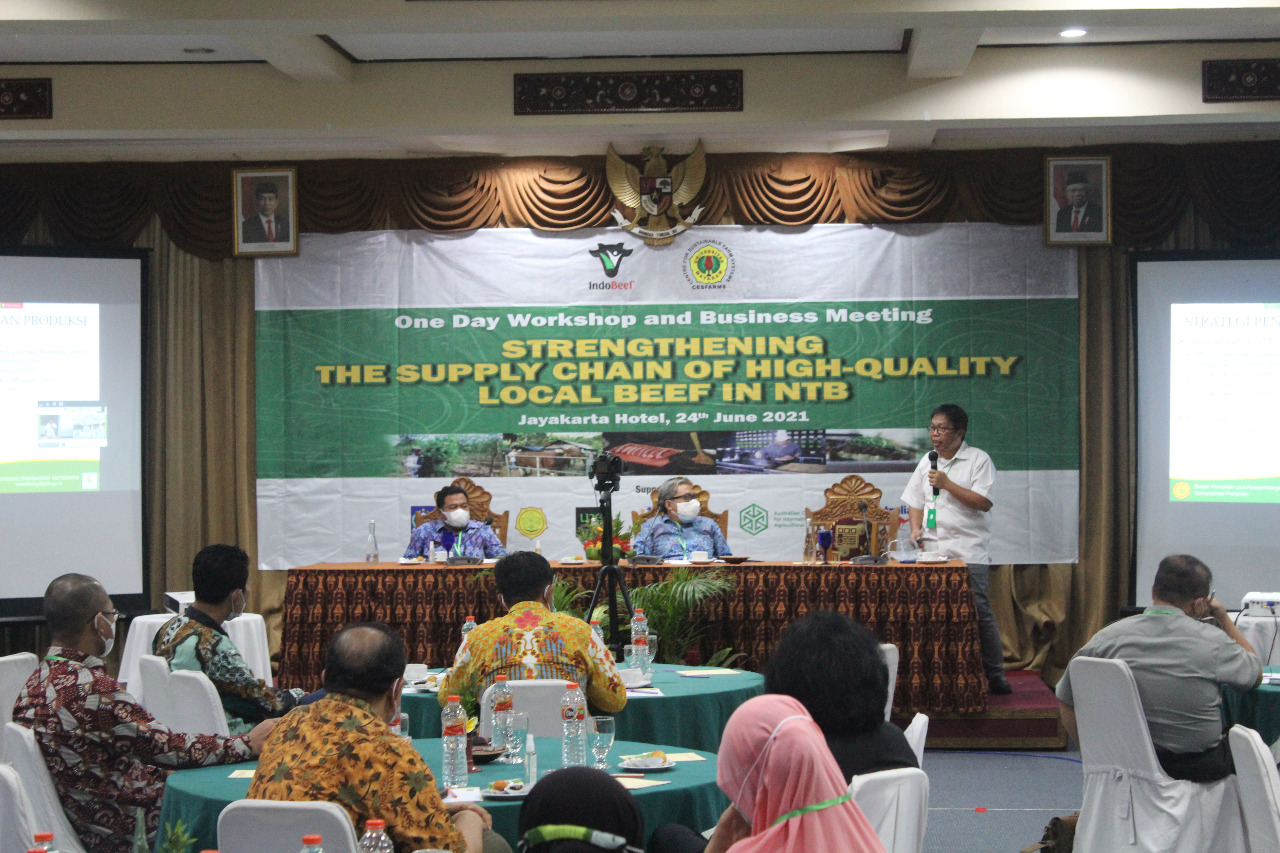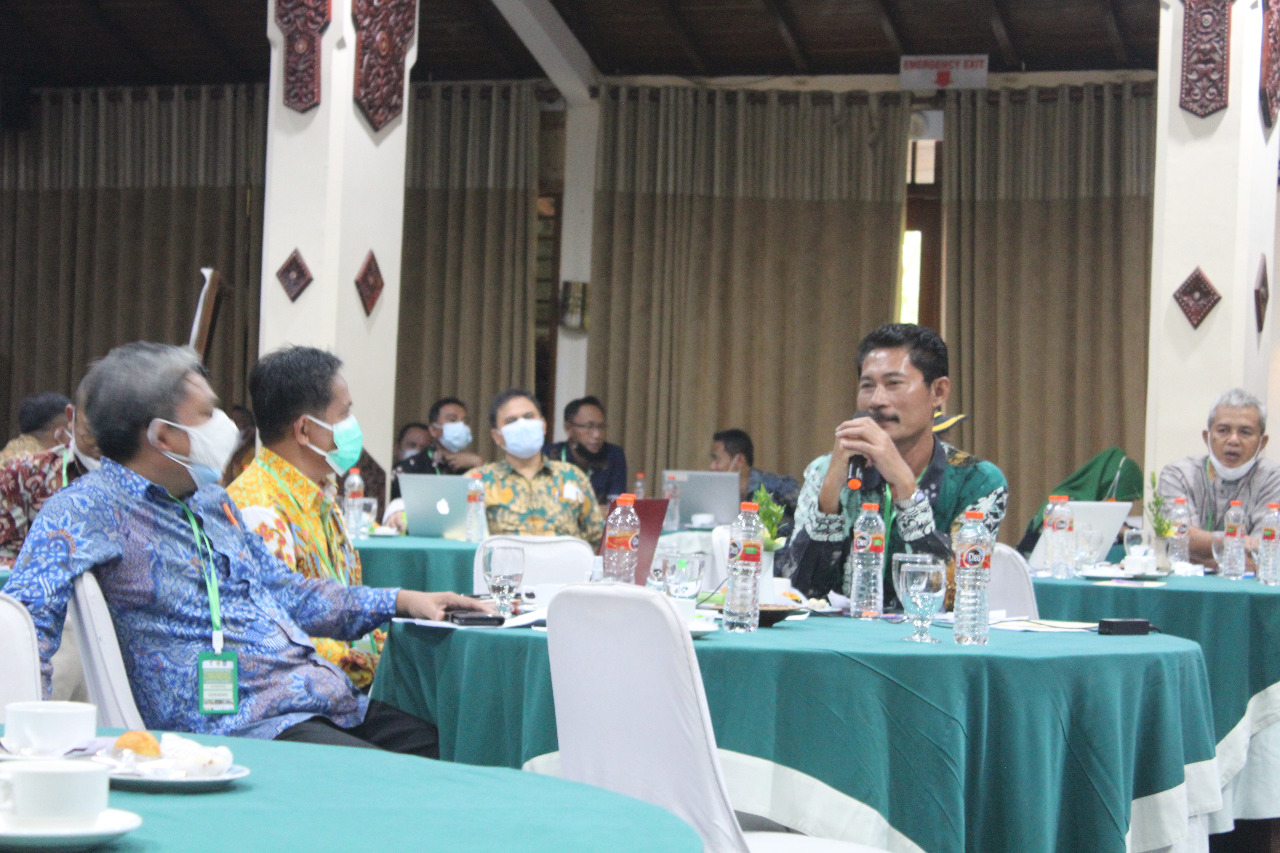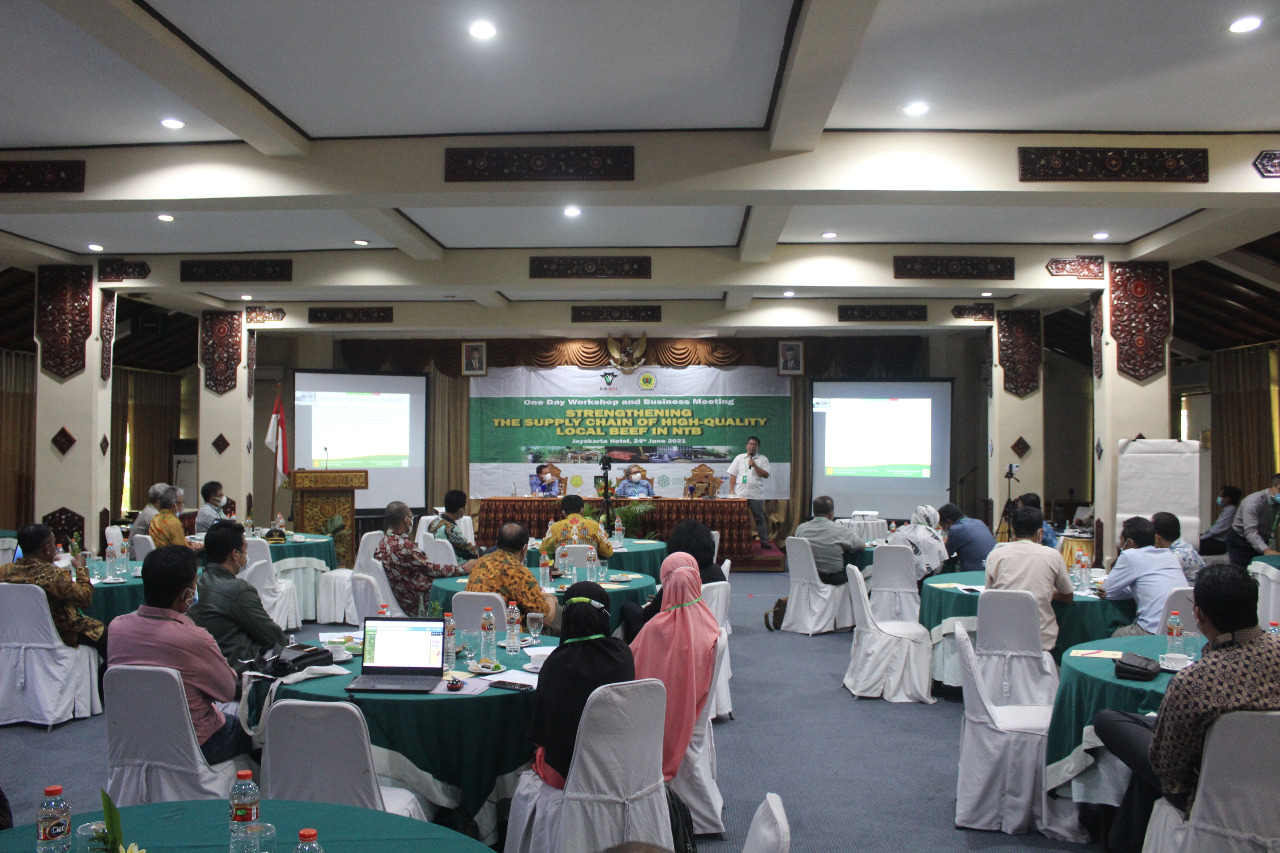WORKSHOP AND BUSINESS MEETING
STRENTHENING THE SUPPLY CHAIN OF HIGH-QUALITY LOCAL BEEF IN NUSA TENGGARA BARAT
AGENDA
Workshop
The workshop was conducted on 24th June 2021 in Jayakarta Hotel, attended by 80 participants. These participants consisted of Government representative (DGLS, regional and district Dinas, IAARD, UNRAM), private sectors including feed lotter, meat processors, modern retailer, palm-cattle enterprise, leather processing company, hotels and restaurant associations, chef association, banks, and farmer organisations. List of participants can be found in the appendix.
The workshop was opened by the Rector of UNRAM (Prof. Dr. L. Husni, SH, M.Hum) followed with opening speech by the representative of DGLS, the representative of IndoBeef (Prof. Heather Burrow), the representative of IFSCA (Prof. Chris Anderson).
After the opening ceremony, an agreement was signed between head of Dinas Peternakan of Dompu District (Ir. Zaenal Arifin M.Si, to represent Dompu Bupati) and Director of Centre for Sustainable Farm Systems (Dr. Sukartono, representing University of Mataram). The agreement outlines collaboration activities between the two institutions to scale out cattle fattening based on Leucaena in Dompu. CESFARMS will be responsible to improve capacity of farmers in Dompu (especially young farmers and entrepreneurs) to conduct cattle fattening business. All costs for these activities will be provided by Dompu district.
Presentation and discussion sessions:
- Presentation from the government and research point of view
- Strengthening supply chain of local beef in Indonesia by the representative of DGLS (Drh. Syamsul Ma’arif, MSi, the Director of veterinary public health).
- Analysis of supply demand of beef cattle in NTB by the Head Office of Livestock and Animal Health Service (drh. Khairul Akbar, MSi).
- Challenge and opportunity for investment on beef cattle in NTB by Prof. Dahlanuddin to represent IndoBeef and Cesfarm.
- Strategies to improve beef cattle production and quality in NTB by Dr. Tanda Panjaitan to represent IndoBeef and IAARD.
- Focused group discussion on private sectors investment
- Challenge and opportunity on feed lotting using local beef and collaboration with small holders (by drh. Nanang P Subendro, PT. Indo Prima Beef, Lampung).
- Challenge and opportunity to produce beef cattle under the palm plantation (Dr. Wahyu Darsono, PT. Simbiosis Karya Agroindustri, South Kalimantan).
- Opportunity to utilize derivative product from cattle (skin and leather), (Dodi Gustari, PT. Garut Makmur Perkasa, West Java).
- Focused group on responses of District responses
- Dompu: lessons learnt to develop collaboration with private sector on cattle marketing.
- Sumbawa: lesson learnt to develop food estate based on cattle fattening fed by lamtoro.
- West Sumbawa: lesson learnt to develop collaboration with other institution (LHK) for forage production.
- East Lombok: lesson learnt to facilitate subsidised small scale loan scheme.
- Central Lombok: lesson learnt to manage super priority program to boost cattle production by the central government (1000 Desa Sapi / 1000 cattle village).
Business Meeting
- The business meeting was started by presentation of workshop summary by the Provincial Head office of Livestock and Animal Health Service (drh. Khairul Akbar, MSi), followed by opening speech by the Rector of UNRAM (Prof. Dr. L. Husni, SH, M.Hum) followed by speech by the Governor of NTB (Dr. Zulkieflimansyah).
Business prospective discussion facilitated by Dr. Prayitno Basuki (Faculty of Economic and Business University of Mataram).
WORKSHOP AND BUSINESS MEETING OUTPUTS:
- Workshop
Opening speech
- DGLS acknowledge that the cattle population in Indonesia is not sufficient to meet the national demand. The local production is only able to supply 60% of the demand hence 40% needs to be imported. To overcome this shortage, the Indonesia Government set up a super priority program to boost cattle population by means of Food estate, 1000 cattle village, SIKOMANDAN programs and bank loan scheme (KUR) and improve cattle transportation to facilitate logistic.
The short program to meet the meat demand is importing frozen meat from India and other countries in addition to live cattle import from Australia.
Other important issue that addressed by Director of Vet public health was meat eating habit from warm meat to fresh meat, improving the quality of slaughter houses and other meat processing change to support the change the meat-eating habit.
The decrease in size and quality of local beef cattle slaughtered was also another concern delivered by the Director.
- The Rector of UNRAM underlined that collaborative research between UNRAM and BPTP has been done for more than 20 years producing a number of readily available proven technologies in cattle production, processing and marketing that can be scaled out by local government and other users.
- Heather Burrow shared beef industry development in Australian and the change of production system driven by consumer demand. This has led to Meat Standard Australia that subsequently change the whole system. There was instability of production system in Australia between 1970 and 1990 which was similar situations like what Indonesia has nowadays. Therefore, Indonesia can learn from this experience to build the Indonesian beef industry and formulate the Meat Standard Indonesia.
- Chris Anderson noted the collaborative IFSCA program between UNRAM and Massey University was built upon previous research collaboration between other agencies including ACIAR and IAARD. The IFSCA has seeded development of the Centre for Sustainable Farm Systems (Cesfarms) in UNRAM.
Discussion sessions
- Discussion from the government and research point of view
- Analysis of supply demand of beef cattle in NTB by the Head Office of Livestock and Animal Health Service (drh. Khairul Akbar, MSi):
- Indonesia deficits of 278.000 tons of beef meat per year equals to 1.4 million head of cattle.
- NTB is one of surplus provinces in beef cattle. Total surplus number is 88.329 cattle that can be exported between provinces while the current domestic demand is 13.123 tons per year that equals to 66.000 head of cattle. The surplus is originally from Sumbawa Island. Lombok Island receives more than 40,000 cattle /year from Sumbawa.
- NTB has set up policy to reduce live cattle inter island export in order to build local cattle processing business in NTB. The short program is by revitalizing the existing slaughter houses to meet national and international standard.
- The Provincial Office of Livestock and Animal Health will incorporate cattle fattening based on Leucaena into their program to improve and boost beef cattle production in NTB.
- Strategies to improve beef cattle production and quality in NTB by Dr. Tanda Panjaitan to represent IndoBeef and IAARD:
- Many research on cattle production had been conducted in the last three decades in NTB through government support and in collaboration with international agency such as ACIAR.
- The research has found proven strategy to improve cattle production and quality and had been tested in the field with consistent output.
- The proven technology named Integrated Village Management System. This proven technology increases productivity (can potentially double meat production) through an increase in calving rate, growth rate and reduce calf mortality.
- Challenge and opportunity for investment on beef cattle in NTB by Prof. Dahlanuddin to represent IndoBeef and Cesfarms:
- Live cattle export from NTB to Jakarta and other island has decreased consistently due to an increase in local consumption and uncompetitive prices.
- The uncompetitive price is associated with high feeder stock prices due to inefficient small holder system and the purpose of rearing cattle as a saving.
- Small holder producers in Sumbawa are only able to increase the cattle live weight to maximum of 250 kg because they need to sell their cattle to earn income. It will take too long for them to increase the live weight to 300 kg or more.
- Traditionally, this type of cattle is shipped to Lombok for traditional fattening.
- There is a provincial regulation prohibiting cattle shipment under 300 kg from Sumbawa to Lombok.
- This opens an opportunity for private companies to become the off taker, growing 250 kg cattle into 400 kg, meat processing business by using local beef and sell beef to many different markets based on classes of beef.
- Potential models for private sector investments in NTB cattle industry:
- Partnership between private and small holders in breeding and fattening to produce high quality local beef.
- A breeding based on grazing system using state land by private company to produce a competitive feeder stock.
- Private sector as off takers for feeder cattle (200-250 kg) produced by the local farmers, and further fatten them under feedlot system to 400 kg before being slaughtered in the modern abattoir.
Beef to be marketed by modern retails (such as Lotte Mart) to various markets within and outside NTB based on beef cuts.
